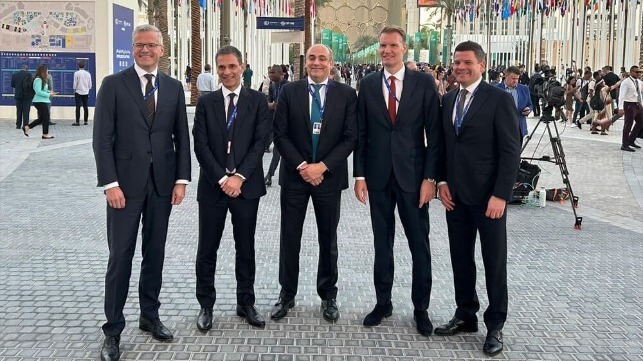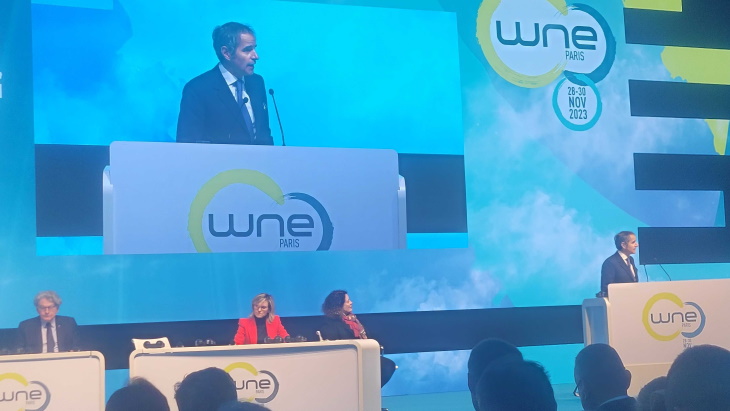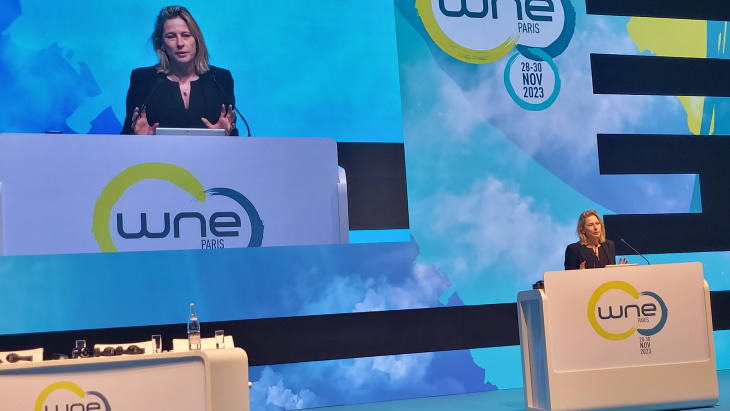Hypocrisy Sours COP28
Hypocrisy runs rampant at COP28 even before the doors swung open to 70,000 delegates on Thursday, November 30th. This is the 2023 UN Climate Change Conference or Conference of the Parties (“COP”) held at Expo City, Dubai. It’s the big annual event for scientists to meet to decide on the fate of anthropogenic climate change, assuming that’s even possible.
This year’s big climate summit is headed by Sultan Ahmed Al-Jaber, CEO of Abu Dhabi National Oil Company (“ADNOC”) of the United Arab Emirates. Leaked documents show Emirati officials using their leadership position at the climate summit to “lobby for oil and gas deals around the world.” That’s disgusting and an international scandal of the highest order. Although, November 29th Ahmed Al-Jaber vociferously denied the allegations, according to Bloomberg News.
Nevertheless, the Centre for Climate Reporting as of November 27th reported COP28 President Secretly Used Climate Summit Role to Push Oil Trade with Foreign Government Official: “Leaked documents reveal COP28 president and UAE national oil company boss Sultan Al Jaber’s plans to discuss boosting fossil fuel business in bilateral meetings about the climate summit.”
Also, according to a BBC report, November 28th: “Al Jaber… has held scores of meetings with senior government officials, royalty, and business leaders from around the world in recent months. The COP28 team has quietly planned to use this access as an opportunity to increase exports of ADNOC’s oil and gas.”
Leaked briefings show Al-Jaber planned to use his new-found international leadership role as president of COP28 to raise commercial interests with almost 30 countries. A whistleblower came forward on condition of anonymity, confirming follow up discussions with at least one commercial party.
Professor Michael Jacobs of Sheffield University, commenting to the BBC: “As a COP president you should not represent any national or commercial interest, it is your job to lead the world… The UAE at the moment is the custodian of a United Nations process aimed at reducing global emissions. And yet, in the very same meetings where it’s apparently trying to pursue that goal, it’s actually trying to do side deals that will increase global emissions.”
Internal emails and meeting records obtained by the Centre for Climate Reporting raise serious questions about the COP28 leadership team’s independence from the national oil company ADNOC. Moreover, whistleblowers claim COP28 staff were in regular contact with the national oil company over talking points for ADNOC targeting specific country oil deals.
The New York Times further reported Using Climate Talks to Sell Fossil Fuels, November 28th: UAE officials used their position of influence at the climate conference behind the scenes to influence Brazil’s environment minister to help with a local petrochemical deal by ADNOC. And Emirati officials, using their position at COP28, influenced Chinese counterparts about working on a joint international LNG opportunity. The article goes on to say that diplomats and climate experts from around the world have expressed shock at the leaked documents.
According to Christiana Figueres, former UN diplomat: “The U.A.E. has been caught red-handed.”
Early supporters of Al-Jaber for president of COP28 claim he was well positioned to convince oil producers of the world to tackle climate change. According to the IEA, the world’s oil and gas industry accounts for only one percent of all global investment in clean energy. Supporters claimed Al-Jaber would substantially increase that number.
However, COP28 has now turned into a scandalous deception undermining hope for mutual trust amongst members, as well as deflating hopes for significant progress, even before the summit began.
All of which begs the provocative question of how in the world did the UAE become host to a climate change conference in the first instance? And even more perplexing yet, how did Al-Jaber become president of COP28? Is COP a Cabal of Producers or a Conference of the Parties for climate change purposes?
“They went too far in naming the C.E.O. of one of the largest — and by many measures one of the dirtiest — oil companies on the planet as the president of the U.N. Conference on Climate this year,’ former vice president Al Gore.” (Source: Fossil Fuels and Frustration at COP28, The New York Times, November 30, 2023)
The hypocrisy runs even deeper than Al-Jaber and the UAE. Although, it’s nearly impossible to match the alleged duplicity, chicanery of Al-Jaber/UAE using the UN Climate Conference as an easily manipulated stooge to promote their own oil and gas deals.
A recent UN Environment Programme in collaboration with academic institutions studied plans for the 20 largest fossil fuel producing countries that account for 84% of global carbon emissions: “The findings paint a grim picture: Governments’ plans show they intend to produce, in total, 110% more fossil fuels in 2030 than are compatible with the 1.5°C limit set out in the Paris Agreement, and 69% more than is consistent with 2°C of warming.” (Source: The Production Gap)
Expected Oil & Gas Commitments at COP28
According to the World Resources Institute: “It’s essential that this UN climate summit not become a platform for pledges by the oil and gas industry that fail to tackle the core issue at stake. At COP28, the UAE is expected to announce a commitment from at least 20 major oil and gas companies to reduce methane leakage and reach net-zero emissions by 2050 – but only for their own operations, not for the fuel they sell. By not addressing the so-called “Scope 3” emissions of the fuel produced from their oil and gas extraction and then sold, the oil and gas industry is sidestepping the emissions that account for up to 95% of its contribution to the climate crisis.”
Meantime, alarming data about forthcoming global warming and ecosystem degradation across the globe is far beyond the mindset and scope of intellect of host country UAE to handle a major UN Climate Change Conference. It simply does not fit. It’s embarrassing!
The focus of COP28 should be on relevant science: Earth’s energy imbalance or “sunlight in” versus “sunlight out” is currently running at a frightful rate @ 1.36 W/m2 as of the 2020s decade. This is beyond troubling. It’s double the 2005-2015 rate @ 0.71 W/m2 (James Hansen,”Global Warming is Accelerating. Why? Will We Fly Blind?” September 14, 2023). W/m2 is watts per square meter. Accordingly, there’s more energy coming in (absorbed sunlight) than energy going out (heat radiated to space) doubling within only one decade, which is beyond belief, assuring very challenging bad news down the line. This is an enormously dangerous climate event that’s already in process with potentially devastating earmarks.
It’s not surprising that Dr. James Hansen, Earth Institute, Columbia University expects an early arrival of the dreaded 2.0°C above pre-industrial by the late 2030s, far ahead of IPCC expectations, which will crush many life support ecosystems; meanwhile, according to the International Energy Agency (IEA) fossil fuel producers plan on cranking up production to record levels. Thus, both global warming and oil production can join hands simultaneously setting new records.
All the above adds up to disturbing levels of an indescribable insanity; furthermore, more insanity is expected as climate analysts expect an avalanche of greenwashing at COP28, already identified by the World Resources Institute in the preceding fourth paragraph.
Speaking of which, Al-Jaber informed Bloomberg News, November 29th, “all of his meetings have been focused on how the world can collectively keep global temperature rise below 1.5C from pre-industrial levels.” Al-Jaber also previously said that emissions must be cut by 43% by 2030 because that’s what the science says must be done. Yet, ADNOC, his oil company, has plans to increase oil production by 600,000 barrels per day by 2030, spending $150B for more oil production.
Go figure!
Robert Hunziker (MA, economic history, DePaul University) is a freelance writer and environmental journalist whose articles have been translated into foreign languages and appeared in over 50 journals, magazines, and sites worldwide. He can be contacted at: rlhunziker@gmail.com. Read other articles by Robert.









 Grossi speaking during the opening session at WNE (Image: WNN)
Grossi speaking during the opening session at WNE (Image: WNN)





.jpg?ext=.jpg) Sama Bilbao y León said the significance of the declaration could not be overstated (Image: WNA)
Sama Bilbao y León said the significance of the declaration could not be overstated (Image: WNA) (Image: WNN)
(Image: WNN)